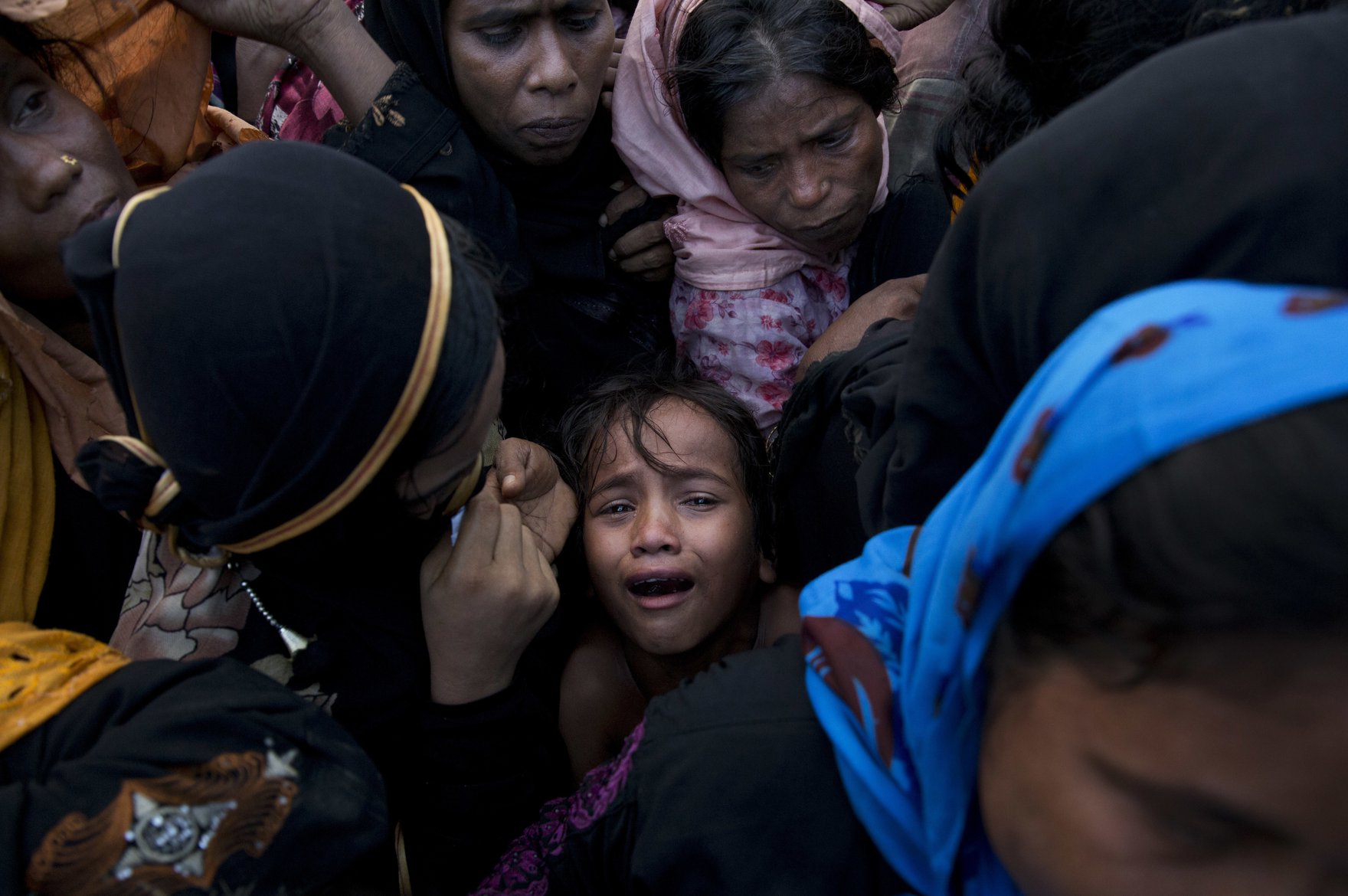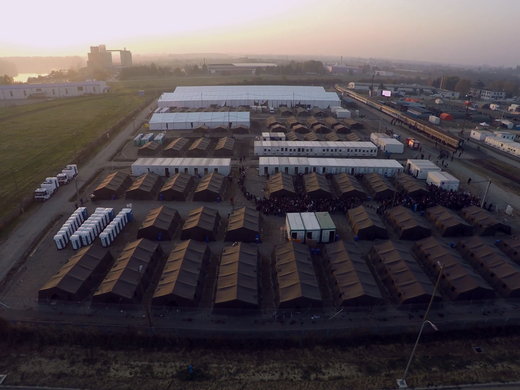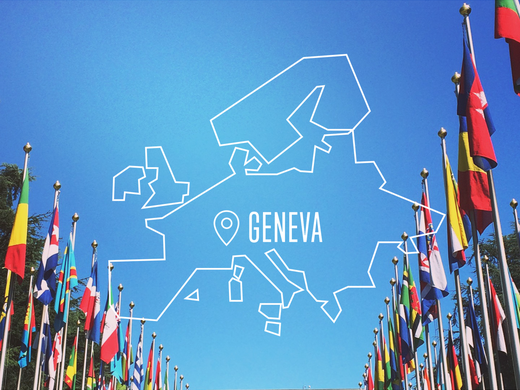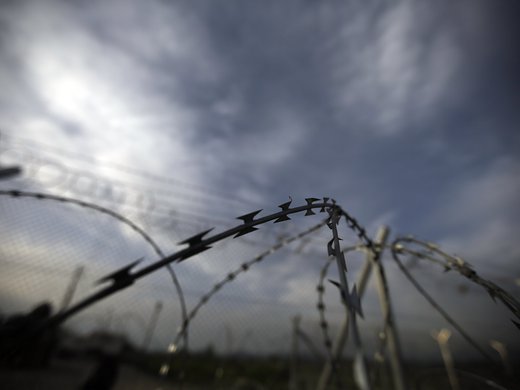The mass exodus of Myanmar’s stateless Muslim minority has been condemned as ethnic cleansing. Sara Perria visited Myanmar’s Rakhine State, shortly before the military’s latest offensive, to report on how gender based violence against Rohingya women is used as a weapon of war, and how camps for internally displaced persons managed by the international community are becoming breeding grounds for abuse.
The numbers keep rising. According to the latest report from the United Nations, more than half a million Muslim refugees have crossed into Bangladesh in just over a month, fleeing a scorched-earth offensive by the Myanmar military and vigilantes against Rohingya militants.
Women and children make up a majority of the mostly stateless Rohingya refugees. Amid accusations of ethnic cleansing by the Myanmar military, aid workers in border camps are being overwhelmed in dealing with cases of gender-based violence.
The United Nations Population Fund (UNFPA) said this week it was listening to “horrific stories” from survivors of gender-based violence. The UN agency stresses that this is the “tip of the iceberg” as many cases go unreported by victims because of “safety, confidentiality, shame and stigma”. It says it has offered services to more than 7,000 women through “women-friendly spaces” as well as community watch groups and medical camps.
“More than half of the gender-based violence incidents reported so far to UNFPA and its partners by Rohingya women refugees in Bangladesh are sexual assault, an exceptionally high proportion. This speaks to a very worrying trend,” the agency said this week, noting it was struggling to meet demand for its services.
“The crisis is so huge we just cannot keep up with everything,” commented Chris Lewa of the Arakan Project, a non-governmental organization with local staff that has worked for nearly 20 years with the Rohingya community.
Such reports are tragically familiar, however, to those aid workers who only late last year were responding to an exodus of some 80,000 Rohingya from Rakhine State following an earlier military offensive against insurgents of the Arakan Rohingya Salvation Army (ARSA).
In the wake of that campaign, which also involved torching and looting villages, fishing boats started crossing from Bangladesh into Myanmar smuggling a very different kind of cargo.
Responding to requests from Muslim women confined to their villages by the Myanmar military, fishermen were plying the Naf border river with boxes of Misoprostol. Normally a medicine for stomach ulcers, Misoprostol is also taken as an abortion pill.
No one knows how many women and girls were raped by Myanmar soldiers in last year’s “clearance” operations, which followed ARSA attacks on border posts. Some estimates run into the low hundreds. Two UN reports related accounts of gang rapes. The UN human rights arm said last February that widespread human rights violations “indicate the very likely commission of crimes against humanity.”
“I was in the room with my brothers. They asked the men to go out. Then they took my clothes off and they raped me,” 18-year old Rachida* said in an interview. “They did the same with my 14-year old sister who is mentally ill,” she said, reached via video call in an area of Maungdaw township closed to journalists and international aid workers.
Her face visible beneath an apricot-coloured veil, she described how she later told her mother she had missed her period. “She took us to a doctor in another village. We both took the pills, we had to take several. Then I had my period again. I had cramps and it was painful, but now I feel relieved,” she said, relating the events of December.
That area of northern Rakhine, which has been at the centre of the latest offensive, remained under tight military control. Accusations flew back and forth as the international community struggled to come up with a response, and aid agencies were left managing IDP camps inside Rakhine.
“I heard allegation after allegation of horrific events like these – slitting of throats, indiscriminate shootings, setting alight houses with people tied up inside and throwing very young children into the fire, as well as gang rapes and other sexual violence,” Yanghee Lee, UN special rapporteur on human rights in Myanmar, stated when she visited Bangladesh.
But cases of false accounts of rape were used by the military and Aung San Suu Kyi’s government to dismiss allegations altogether. “Fake rape,” government spokesman Zaw Htay proclaimed on Facebook. The government says it examines allegations of abuse but has denied visas to UN Human Rights Council investigators.
Medical sources in Cox’s Bazar in Bangladesh said that 16 women among refugees arriving in December alone had sought medical help for symptoms compatible with rape. A senior UN source said staff had been approached in recent months by women claiming to have been raped and asking for help in obtaining abortion pills. UN agencies do not provide such services.
“Some women asked for it [the pill] and we know they used it,” commented Ms Lewa, who said she was aware of abortion pills smuggled on boats.
Sexually transmitted diseases are also a serious issue, particularly the HIV virus that causes AIDS and is an epidemic in Myanmar.
Fatima, who is 15, said she has felt pain since she was raped but could not see a doctor because her family did not have money. Speaking by video call, she asks the only man in the room to go outside before describing how she was knocked down with the butt of a gun and raped while her brothers were arrested. “I feel I want to die,” she says.
Rape has been used as a weapon of war for decades in ethnic conflicts across Myanmar – by the Tatmadaw, as the Myanmar military is known, and by ethnic armed groups. A well-known case of two volunteer Kachin teachers raped and murdered in Kachin state close to a military base has never been resolved under a legal system that gives the military immunity from prosecution in civilian courts. Pictures of their bodies were posted on social media with no respect for their dignity.
“This is part of a pattern of high levels of social acceptance of violence against women,” says Alexandra Robinson, a gender-based violence program specialist for the UNFPA.
As Myanmar started on its gradual transition towards democratic rule, international organisations engaged with institutions and local non-governmental organizations to provide training on combating gender-based violence. Most involved the police force, with training given by the International Committee of the Red Cross, the European Union and UNFPA.
A “Women and Girls First Initiative” launched by the UNFPA was active in Rakhine and four other states with large ethnic minority populations. Aimed at combating gender-based violence and supporting sexual, reproductive, health and women’s rights, a major theme was “access to Justice.” But funding from a handful of western nations has been limited. “There needs to be significant investment in [gender-based violence] in Myanmar,” says Robinson, speaking before the latest crackdown and refugee exodus.
Violence in the camps
The current crackdown in northern Rakhine is the most violent chapter of a policy of persecution and institutionalised discrimination against this mostly stateless minority of about one million people. Violence that erupted in 2012 between Rohingya communities and the Buddhist Arakan majority led to the forced displacement of some 140,000 people, mostly Muslims, to Internally Displaced Persons (IDP) camps. Five years later and some 100,000 are still crammed into squalid, disease-ridden camps — mostly south of the current military operations — with the Myanmar government offloading the task of maintaining what amount to detention centres to the United Nations and foreign aid organisations.
Violence against Rohingya women by men of their own community in these camps is a serious but much less reported issue. This is highly relevant for aid agencies struggling to cope with the present emergency along the Bangladesh border.
“Adolescent girls in overcrowded IDP camps are at particularly high risk,” says Robinson of the UNFPA. “The situation is compounded by lack of privacy and a breakdown of usual community structures which can offer a form of protection from sexual harassment, violence, and early marriage,” she adds, noting that early marriage for girls becomes a well- known “coping mechanism” for displaced families.
Camps in Rakhine are overpopulated, badly lit and have common toilets. Alcohol and drug abuse are on the rise in an alienating existence of forced unemployment. What data exists on the numbers of victims of gender-based violence is not published or even shared within organisations. But aid workers say cases are reported on a regular basis, also involving adolescents.
“We have no privacy, not even to take a shower,” says Nur, sitting on a plastic chair in a room shared with her husband, children, and the family and children of her daughter. They live in Pawktaw, a squalid camp of rotting bamboo structures surrounded by mud and stagnant water an hour by boat from Sittwe, the state capital.
The camps were said by the government to be “temporary” but an institutionalised policy of segregation is entering its sixth year. International non-governmental organizations lament a lack of funding even to provide hygiene kits of soap and pads. Information regarding reproductive health, planning and contraception is given, but it is unlikely to tear down conservative cultural barriers that leave little choice to women. Many have six or seven children.
Exposed to violence, women suffer the deep stigma of their community, from public flogging to forced marriage. On the records of humanitarian organisations involved in security there are cases of women who asked to move to a different camp to avoid “punishment” for having been raped while rejecting forced marriage to the perpetrator.
Even before conditions worsened after 2012, the maternal mortality rate in Rakhine state — where many of the Buddhist Arakan majority also live in extreme poverty — was recorded at 380 deaths per 100,000 live births. This is twice the average of countries in South Asia and compares with Myanmar’s national rate of 280 deaths.
International community struggles to respond
Myanmar, both its military and its civilian government, are under mounting international pressure to halt the conflict.
But divisions at an international level are also evident, with China offering diplomatic protection to its neighbour.
On Thursday, UN Secretary-General Antonio Guterres urged the Security Council at its first open meeting on Myanmar in eight years to take strong action. He called on Myanmar to stop military operations immediately, allow “unfettered access” for humanitarian aid and allow all the refugees to return.
Nikki Haley, US ambassador to the UN, said action should be considered against Myanmar security forces implicated in abuses. "We cannot be afraid to call the actions of the Burmese authorities what they appear to be: a brutal, sustained campaign to cleanse the country of an ethnic minority," she said.
China, which has invested heavily in Myanmar and has been a close supporter of the military, made clear however that it was not backing any radical Security Council intervention.
"As we speak, the situation on the ground is beginning to move toward stability," deputy Chinese ambassador Wu Haitao said, according to a report by Associated Press. "All parties should work constructively to help reinforce this momentum, de-escalate the situation and alleviate the humanitarian conditions step-by-step."
Russia also warned that “excessive pressure” on the Myanmar government would only serve to aggravate the crisis.
More than 80 civil society organisations calling themselves a global coalition warned the international community against paralysis and slammed the European Union for dropping a human rights resolution against Myanmar a year ago.
“If governments, UN officials and diplomats simply hold meetings and make speeches as atrocities continue in Myanmar, they bear the risk of failing to use every diplomatic tool at their disposal to stop the ethnic cleansing campaign and further crimes against humanity,” the groups said in an open letter. “In the face of mass destruction, killings and hundreds of thousands displaced, inaction should not be an option.”
*Names of Rohingya women in this article have been changed to protect their identity as others have suffered reprisals after talking to outsiders.



